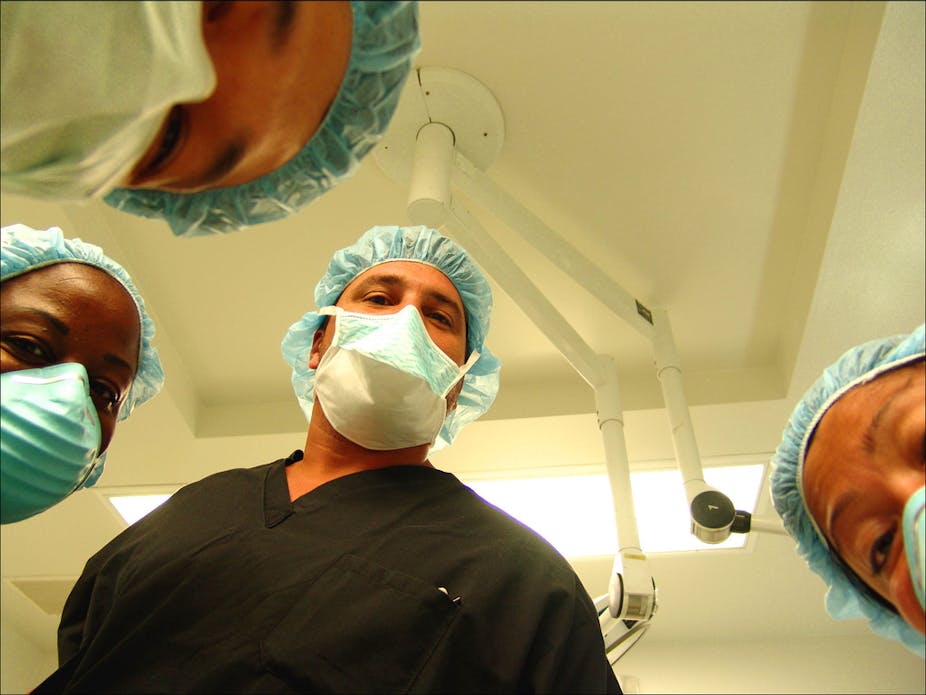Around 2.6 million or 10% of Australians are obese. Obesity contributes to other diseases, such as diabetes, high blood pressure, obstructive sleep apnoea, infertility, depression and cancer. The strength of this causal link means obesity is now considered at least equal to smoking as a preventable cause of premature death.
The total annual cost of obesity in Australia, including health system costs, productivity declines and carers’ costs, is estimated at around A$58bn. It’s morbidity and cost (as well as prevalence) has led Australian governments to recognise obesity as a chief health priority, at both the federal and state levels.
Weight loss has the potential to be an important health-care intervention in our community. The problem is that diet and exercise programs are typically only successful in the short term. Only 3% of people who successfully lose weight can maintain that loss beyond three years. This is not because these individuals are in some way inept or unwilling, but because our bodies are designed to defend fat mass.
Hunger is a primitive instinct. In evolutionary terms, fat stores represented stored energy that’s vital in case of famine. When someone loses weight, the body strives to replace depleted energy stores. Their metabolic rate slows down so that people seeking substantial weight loss and maintenance need only 1200 kCal (1,000 calories) a day – the equivalent of three entrée-sized meals. If more than this very small amount of food is consumed, weight will be regained.
Losing weight also shifts our hormonal balance so that we become hungrier, making it almost impossible to adhere to the stringent long-term need for caloric restriction. In a society where there is an oversupply of tasty, attractive, hygienic food that is cheap, well marketed and very much a part of our cultural life, it’s difficult to not eventually satiate this new-found hunger.

Drugs have been tried to help tackle either the hunger associated with weight loss or the metabolic slow down. Unfortunately, their side effects have led to most being withdrawn from the Australian market.
Obesity (bariatric) surgery becomes an option when someone has tried, and failed, to lose weight. Results from specialist centres and clinical trials suggest this procedure provides significant weight loss safely and that the loss persists beyond ten years. Weight loss is accompanied with significant improvement in the illnesses associated with obesity and in quality of life.
Obese people who undergo bariatric surgery appear to live longer than obese people who don’t. On the basis of these results, there’s been a rapid expansion in the number of bariatric procedures performed in Australia annually; an estimated 13,000 procedures will be undertaken across Australia in 2012, up from 5,000 in 2005.
But while results from specialist centres suggest the surgery is safe, there’s no such thing as a risk-free surgical procedure. All surgery carries risks, such as bleeding, blood clots, infection, device or staple line failure. We currently have little information on the quality and safety of the surgery being performed in the general community, outside of specialist centres, and no way of tracking long-term safety and results.
To address this, a bariatric registry has been established by the Obesity Surgery Society of Australia and New Zealand in conjunction with the NHMRC Centre for Research Excellence in Patient Safety. Currently in its pilot phase, the registry aims to capture and track all bariatric procedures performed across Australia and New Zealand, focusing not only on the safety of the initial procedure but also longer-term effects on weight and health, as well as any adverse events.

Quality and safety registries have been shown to improve health outcomes. Monitoring of outcomes following orthopaedic surgery through the Australian Joint Replacement Registry, for instance, recently led to the withdrawal of a defective hip prosthesis from the market.
The establishment of this registry is in line with the 2008 recommendations of the Australian Commission on Safety and Quality in Healthcare and the 2009 Health Technology Review report.
There are also two specific recommendations for the establishment of a bariatric surgical registry: the Georganas Senate inquiry into obesity (2009) and the 2011 Medical Benefits Reviews Task Group.
While prevention is the ideal, we are now faced with a situation where almost a quarter of our population needs help to lose weight and keep it off.
Bariatric surgery appears to be a safe, reliable option for people who’ve failed to lose weight. The establishment of a bi-national bariatric register will provide confidence to patients, surgeons, funders, hospitals and the wider community that bariatric surgery is safe and improving the health of patients.

